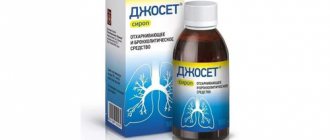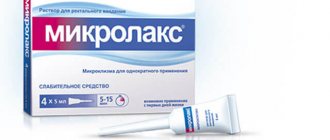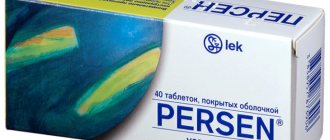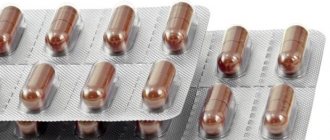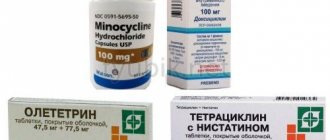Cytovir-3 is a type of medication with immunomodulatory action, where the main age category of patients is children under 12 years of age. This drug is well suited both for a full course of treatment and for the prevention of diseases of viral origin.
The basis of the medicine is the following substances:
- bendazole;
- thymogen sodium;
- ascorbic acid.
All forms of release of Tsitovir-3 should be stored at a temperature not exceeding +25 °C. The shelf life is 2 years from the date of production.
Compound
One milliliter of syrup contains:
- as active ingredients - sodium salt of α-glutamyl-tryptophan - 1 ml, bendazole - 1.25 mcg, ascorbic acid - 12 mg;
- as excipients - sucrose, water.
| Capsules | 1 caps. |
| active substances: | |
| alpha-glutamyl-tryptophan sodium (Thymogen® sodium) | 0.5 mg |
| ascorbic acid | 50 mg |
| bendazole hydrochloride (Dibazole) | 20 mg |
| excipients: lactose monohydrate - 97.8 mg; calcium stearate - 1.7 mg | |
| capsule shell: body (titanium dioxide - 2%, gelatin - up to 100%); cap (titanium dioxide - 2%, Sunset yellow dye - 0.2190%, Azorubine dye - 0.0328%, gelatin - up to 100%) |
Cytovir - what kind of medicine is this?
Children's Tsitovir is a means of immunostimulating therapy that has a pronounced interferonogenic effect. The drug enhances the process of interferon synthesis, which affects the functioning of the immune system. Interferon-induced enzymes suppress viral replication processes, preventing their reproduction.
In parallel, the drug activates immunocompetent cells, which leads to normalization of the immune status. There is an improvement in the body's defenses. Given this effect, Cytovir children's syrup is also used to prevent colds. Correct and timely use of the medicine helps prevent the development of ARVI.
Cytovir - composition
The drug is available in several dosage forms: powder for preparing a solution, capsules, ready-made syrup. Cytovir tablets are prescribed mainly to adults and adolescents. In pediatric practice, doctors more often use Cytovir syrup for children.
The medicine has a simple but highly effective composition:
- Ascorbic acid – has an anti-inflammatory effect, reducing the synthesis of response proteins. In addition, vitamin C has pronounced antioxidant properties.
- Bendazole - stimulates the synthesis of endogenous interferon, which prevents the reproduction and spread of the virus in the body.
- Thymogen - acts directly on the T-cell areas of the immune system, which actively fight the cause of the disease.
Having not used the drug before, many mothers look warily in its direction. The medicine actively affects the immune system, reducing the body’s own mechanisms for activating it. However, ongoing studies have proven that Tsitovir-3 children's syrup does not lead to the development of an addictive effect. Upon completion of its administration, the immune system continues to function in its usual rhythm.
Reviews from doctors about Tsitovir syrup
Among the advantages of the drug are: fast and reliable help in the early stages of influenza and acute respiratory infections, pleasant taste, almost complete absence of side effects. The drug is a good prophylactic against ARVI and influenza; it contains no dyes.
Patients are advised to use syrup in case of severe acute respiratory infections, complications in the form of otitis media, bronchitis and other diseases.
When used at the very beginning of illness, the drug allows you to quickly eliminate fever and prevent infection in healthy children. After the entire course was consumed, complete recovery occurred, and after that the disease did not return for a long time.
Among the disadvantages are the lack of results in some cases, the lack of a direct effect on influenza viruses, since the drug only strengthens the immune system.
We looked at "Tsitovir" syrup. Instructions and reviews are provided.
Tsitovir - indications for use
Tsitovir-3 for children is used in the treatment of diseases of viral etiology that affect the upper respiratory tract.
Cytovir-3 children's syrup cannot be used in all cases of viral disease; there are contraindications. The main one is hypersensitivity to one of the components of the drug. If after a single use a rash appears on the child’s body or the patient’s general condition worsens, the drug is discontinued and a doctor is consulted.
Other contraindications to the use of syrup include:
- hypotension, convulsions;
- renal failure;
- atopic form of bronchial asthma;
- reduced blood pressure;
- diabetes;
- thrombophlebitis.
Prevention and complex therapy of influenza and acute respiratory viral infections in adults and children over 6 years of age.
hypersensitivity to the components of the drug;
pregnancy;
children under 6 years of age.
With caution: during breastfeeding (use is possible if the expected benefit to the mother outweighs the potential risk to the child).
In a dry place, protected from light, at a temperature not exceeding 25 °C.
Keep out of the reach of children.
3 years.
Do not use after the expiration date stated on the package.
Expiration date, conditions of sale and storage
The drug in question is available in capsule form in pharmacies without a doctor's prescription. As for syrup for children and powder for the preparation of oral solution, a doctor's certificate is required to purchase them.
The medication in capsule form must be stored at a temperature of no more than 25 degrees. Its shelf life is three years.
The drug in the form of children's syrup should be kept at a temperature of 25 degrees for two years.
The drug in powder form for the preparation of an oral solution is stored only in a dry place where the air temperature does not exceed 25 degrees. The shelf life of this form is three years.
The prepared aqueous solution should be stored in a place protected from light and out of reach of children at a temperature of 0-8 degrees for no more than ten days.
Synonyms of nosological groups
| Category ICD-10 | Synonyms of diseases according to ICD-10 |
| J06 Acute upper respiratory tract infections of multiple and unspecified localization | Bacterial infections of the upper respiratory tract |
| Bacterial respiratory infections | |
| Pain due to colds | |
| Pain in infectious and inflammatory diseases of the upper respiratory tract | |
| Viral respiratory disease | |
| Viral respiratory tract infections | |
| Inflammatory disease of the upper respiratory tract | |
| Inflammatory diseases of the upper respiratory tract | |
| Inflammatory diseases of the upper respiratory tract with difficult to separate sputum | |
| Inflammatory diseases of the respiratory tract | |
| Secondary infections with influenza | |
| Secondary infections due to colds | |
| Influenza conditions | |
| Difficulty secreting sputum in acute and chronic respiratory diseases | |
| Upper respiratory tract infections | |
| Upper respiratory tract infections | |
| Respiratory tract infections | |
| Respiratory and lung infections | |
| ENT infections | |
| Infectious and inflammatory diseases of the upper respiratory tract | |
| Infectious and inflammatory diseases of the upper respiratory tract and ENT organs | |
| Infectious and inflammatory diseases of the upper respiratory tract in adults and children | |
| Infectious and inflammatory diseases of the upper respiratory tract | |
| Infectious inflammation of the respiratory tract | |
| Respiratory tract infection | |
| Qatar of the upper respiratory tract | |
| Catarrhal inflammation of the upper respiratory tract | |
| Catarrhal disease of the upper respiratory tract | |
| Catarrhal phenomena from the upper respiratory tract | |
| Cough in diseases of the upper respiratory tract | |
| Cough with a cold | |
| Fever due to influenza | |
| ARVI | |
| acute respiratory infections | |
| Acute respiratory infection with symptoms of rhinitis | |
| Acute respiratory infection | |
| Acute infectious-inflammatory disease of the upper respiratory tract | |
| Acute cold | |
| Acute respiratory disease | |
| Acute respiratory disease of influenza nature | |
| Sore throat or nose | |
| Cold | |
| Colds | |
| Colds | |
| Respiratory infection | |
| Respiratory viral infections | |
| Respiratory diseases | |
| Respiratory infections | |
| Recurrent respiratory tract infections | |
| Seasonal colds | |
| Seasonal colds | |
| Frequent colds and viral diseases | |
| J10 Influenza caused by an identified influenza virus | Influenza A |
| Influenza B | |
| Influenza type A | |
| Flu type B | |
| J11 Influenza, virus not identified | Flu pain |
| Flu | |
| Flu in the initial stages of the disease | |
| Flu in children | |
| Influenza condition | |
| Influenza | |
| Beginning flu state | |
| Acute parainfluenza disease | |
| Parainfluenza | |
| Parainfluenza condition | |
| Influenza epidemics | |
| J22 Acute respiratory infection of the lower respiratory tract, unspecified | Bacterial respiratory disease |
| Bacterial lower respiratory tract infections | |
| Bacterial respiratory infections | |
| Viral respiratory disease | |
| Viral respiratory tract infections | |
| Inflammatory diseases of the respiratory tract | |
| Difficulty secreting sputum in acute and chronic respiratory diseases | |
| Respiratory tract infections | |
| Respiratory and lung infections | |
| Lower respiratory tract infections | |
| Lower respiratory tract infections | |
| Infectious inflammation of the respiratory tract | |
| Infectious diseases of the respiratory tract | |
| Infectious lung diseases | |
| Infectious diseases of the respiratory system | |
| Respiratory tract infection | |
| Cough with a cold | |
| Pulmonary infection | |
| Acute respiratory tract infection | |
| Acute respiratory viral infection | |
| Acute inflammatory disease of the respiratory tract | |
| Acute respiratory tract disease | |
| Respiratory infection | |
| Respiratory viral infections | |
| Respiratory syncytial virus infection in young children | |
| Respiratory diseases | |
| Respiratory infections |
ARVI
Flu
Considering that Cytovir-3 is an antiviral drug, it is used as a means of treating and preventing influenza and acute viral respiratory diseases.
During breastfeeding and or simultaneously undergoing anticoagulant therapy, use Tsitovir-3 under the close supervision and supervision of a physician.
pharmachologic effect
The drug has an indirect antiviral (active against influenza A and B pathogens and other viruses that cause acute respiratory diseases) and anti-inflammatory effects.
| Category ICD-10 | Synonyms of diseases according to ICD-10 |
| J06 Acute upper respiratory tract infections of multiple and unspecified localization | Bacterial infections of the upper respiratory tract |
| Bacterial respiratory infections | |
| Pain due to colds | |
| Pain in infectious and inflammatory diseases of the upper respiratory tract | |
| Viral respiratory disease | |
| Viral respiratory tract infections | |
| Inflammatory disease of the upper respiratory tract | |
| Inflammatory diseases of the upper respiratory tract | |
| Inflammatory diseases of the upper respiratory tract with difficult to separate sputum | |
| Inflammatory diseases of the respiratory tract | |
| Secondary infections with influenza | |
| Secondary infections due to colds | |
| Influenza conditions | |
| Difficulty secreting sputum in acute and chronic respiratory diseases | |
| Upper respiratory tract infections | |
| Upper respiratory tract infections | |
| Respiratory tract infections | |
| Respiratory and lung infections | |
| ENT infections | |
| Infectious and inflammatory diseases of the upper respiratory tract | |
| Infectious and inflammatory diseases of the upper respiratory tract and ENT organs | |
| Infectious and inflammatory diseases of the upper respiratory tract in adults and children | |
| Infectious and inflammatory diseases of the upper respiratory tract | |
| Infectious inflammation of the respiratory tract | |
| Respiratory tract infection | |
| Qatar of the upper respiratory tract | |
| Catarrhal inflammation of the upper respiratory tract | |
| Catarrhal disease of the upper respiratory tract | |
| Catarrhal phenomena from the upper respiratory tract | |
| Cough in diseases of the upper respiratory tract | |
| Cough with a cold | |
| Fever due to influenza | |
| ARVI | |
| acute respiratory infections | |
| Acute respiratory infection with symptoms of rhinitis | |
| Acute respiratory infection | |
| Acute infectious-inflammatory disease of the upper respiratory tract | |
| Acute cold | |
| Acute respiratory disease | |
| Acute respiratory disease of influenza nature | |
| Sore throat or nose | |
| Cold | |
| Colds | |
| Colds | |
| Respiratory infection | |
| Respiratory viral infections | |
| Respiratory diseases | |
| Respiratory infections | |
| Recurrent respiratory tract infections | |
| Seasonal colds | |
| Seasonal colds | |
| Frequent colds and viral diseases | |
| J10 Influenza caused by an identified influenza virus | Influenza A |
| Influenza B | |
| Influenza type A | |
| Flu type B | |
| J11 Influenza, virus not identified | Flu pain |
| Flu | |
| Flu in the initial stages of the disease | |
| Flu in children | |
| Influenza condition | |
| Influenza | |
| Beginning flu state | |
| Acute parainfluenza disease | |
| Parainfluenza | |
| Parainfluenza condition | |
| Influenza epidemics | |
| J22 Acute respiratory infection of the lower respiratory tract, unspecified | Bacterial respiratory disease |
| Bacterial lower respiratory tract infections | |
| Bacterial respiratory infections | |
| Viral respiratory disease | |
| Viral respiratory tract infections | |
| Inflammatory diseases of the respiratory tract | |
| Difficulty secreting sputum in acute and chronic respiratory diseases | |
| Respiratory tract infections | |
| Respiratory and lung infections | |
| Lower respiratory tract infections | |
| Lower respiratory tract infections | |
| Infectious inflammation of the respiratory tract | |
| Infectious diseases of the respiratory tract | |
| Infectious lung diseases | |
| Infectious diseases of the respiratory system | |
| Respiratory tract infection | |
| Cough with a cold | |
| Pulmonary infection | |
| Acute respiratory tract infection | |
| Acute respiratory viral infection | |
| Acute inflammatory disease of the respiratory tract | |
| Acute respiratory tract disease | |
| Respiratory infection | |
| Respiratory viral infections | |
| Respiratory syncytial virus infection in young children | |
| Respiratory diseases | |
| Respiratory infections |
Contraindications
This drug is contraindicated for use in children under one year of age.
pregnancy;
Before using Cytovir syrup, the use of the medication must be agreed with your doctor. The pediatrician prescribes a course of treatment taking into account the manifestations, the general condition of the child, and the stage of the disease. The medicine is given to the child 30 minutes before meals - this way the active substances are better absorbed and achieve their goal.
Before using the medicine, you should consult your doctor. This will avoid negative consequences and prevent the development of an allergic reaction. When prescribing the drug Tsitovir, the dosage for children is calculated by the doctor based on age.
The duration of the course of treatment is determined by the doctor. In most cases it is 4 days. Patients over 6 years of age can be prescribed Tsitovir for children in capsules. In this case, it is recommended to take 1 capsule 3 times a day. The duration of treatment is determined by the pediatrician based on the clinical picture, taking into account the type of disease.
Wanting to prevent viral diseases during epidemics, parents often ask doctors how to take Cytovir-3 for children for the purpose of prevention. In most cases, experts advise following the same regimen as when treating viral diseases. The syrup is given to the child 2-3 times a day for 3-4 days.
Analogues of the drug according to ATC codes:
ACTINOLYSATE AMINODIHYDROPHTHALAZINDIONE SODIUM ANAFERON ANAFERON CHILDREN'S ARBIDOL ARGINIL-ALPHA-ASPARTYL-LYSIL-VALYL-TYROSYL-ARGININE ARPEFLUE AFFINOLEUKIN BESTIM BIOARON S BRONCHO-MUNAL VOBE-MUGOS E GALAVIT GALAV IT GALAVIT GALAVIT GALAVIT GEPON GLUTOXIM DIOXOMETHYLTETRAHYDROPYRIMIDINE IMMUNAL IMMUNEX IMMUNOMAX IMMUNORM IMUDON IMUNOFAN IMUNOFAN LYCOPIDE METHYLDIOXOTETRAHYDROPYRIMIDINE SULFONISONICOTINOIL SODIUM METHYLURACIL HYDRAZIDE NUCLEINATE NEOVIR SODIUM NUCLEINATE PYROGENALE POLYOXIDONIUM POLYOXIDONIUM POLYOXIDONIUM POLUDANE REXOD RIBOMUNIL RIDOSTIN RUZAM STEMOKIN THYMUS THYMOGEN EXTRACT CYCLOFERON CYCLOFERON ENGIST OL ECHINACEA ECHINACEA COMPOSITUM CH All
Before using the drug CYTOVIR-3, you should consult your doctor. These instructions for use are for informational purposes only. For more complete information, please refer to the manufacturer's instructions.
Pharmacodynamics
The drug is a means of etiotropic and immunostimulating therapy, has an antiviral effect against influenza A and B viruses and other viruses that cause acute respiratory viral diseases.
Alpha-glutamyl-tryptophan (Timogen® sodium) is a synergist for the immunostimulating effect of bendazole, normalizing the T-cell component of immunity.
Ascorbic acid activates the humoral immune system; normalizes capillary permeability, thereby reducing inflammation; exhibits antioxidant properties, neutralizing oxygen radicals that accompany the inflammatory process; increases the body's resistance to infection.
Bendazole induces the body's production of endogenous interferon and has an immunostimulating effect (normalizes the body's immune response). Enzymes, the production of which is induced by interferon in the cells of various organs, inhibit viral replication.
When taken orally, the drug is completely absorbed from the gastrointestinal tract.
The bioavailability of bendazole is about 80%, alpha-glutamyl tryptophan is no more than 15% and ascorbic acid is 90%. Metabolites of ascorbic acid and bendazole are excreted in the urine.
Alpha-glutamyl-tryptophan, under the influence of peptidases, is broken down into L-glutamic acid and L-tryptophan, which are used by the body in peptide synthesis.
Pharmacodynamics
Alpha glutamyl tryptophan (thymogen) enhances the immunomodulatory effect of bendazole, enhancing T-cell immunity.
Ascorbic acid (vitamin C) improves the permeability of capillary membranes, reduces the production of prostaglandins and other inflammatory response proteins, thereby exhibiting an anti-inflammatory effect. Ascorbic acid is a powerful antioxidant that interacts with free oxygen radicals, protecting cells from damage, and improves the body's resistance to infections.
Bendazole initiates the synthesis of interferons (suppress the replication of viruses and intracellular parasites) in the body, exhibits an immunostimulating effect associated with a change in the proportion of cGMP and cAMP in the cells of the immune system (increases the amount of cGMP), this leads to an increase in the number of T- and B-lymphocytes, which in turn, increase the effectiveness of the immune response of the entire body.
Pharmacokinetics
Cytovir syrup is almost completely absorbed into the gastrointestinal tract. The bioavailability of bendazole reaches 80%, alpha-glutamyl-tryptophan - 15%, ascorbic acid - no more than 70%. Ascorbic acid is absorbed mainly in the middle sections of the intestine. The maximum concentration is reached 4-5 hours after administration. Ascorbic acid easily penetrates into all tissues and cells of the body, as well as through the placenta.
With diseases of the stomach and intestines (peptic ulcer, ascariasis, giardiasis and other diseases), increased content of fruits and vegetables in the diet, and alkaline drinking, the binding and penetration of ascorbic acid into the body worsens. Ascorbic acid is metabolized primarily in the liver.
The breakdown products of ascorbic acid and bendazole are excreted by the kidneys. Their half-life is 3 hours.
Alpha glutamyl tryptophan breaks down into individual amino acids, which are used in cells to build protein molecules.
Pharmacokinetics
Cytovir-3 in all forms should be taken orally. Absorption occurs in the upper gastrointestinal tract by 80–90%. In this process, thymogen breaks down into molecules of L-tryptophan and glutamic acid, and subsequently becomes the basis for the production of peptide proteins. They pass through the membrane into leukocyte cells and platelets, accelerating their division, which is a great boost to the immune system. The maximum effect of the drug is observed 4 hours after the dose is taken.
Ascorbic acid is absorbed through the intestinal epithelium by 75–80%. But its beneficial effect is partially neutralized by the presence of intestinal parasites, open ulcers of the stomach and small intestine, and copious amounts of alkaline drinking during treatment. The chemical is naturally metabolized into diketogulonic and oxaloacetic acids and is excreted through the urinary system and sweat glands on the skin. This component of Cytovir-3 penetrates into the breast during lactation, which is important to remember for nursing women.
Side effects
Allergic reactions, short-term decrease in blood pressure.
Usually the drug is well tolerated by patients, but in rare cases the following side effects may occur:
- from the gastrointestinal tract - heartburn, feeling of nausea;
- from the genitourinary system: damage to the nephrons of the kidneys, crystalluria, formation of stones in the kidneys and bladder;
- allergic reactions: redness, itching, rash, urticaria, Quincke's edema; very rarely - anaphylactic shock;
- from the endocrine system: damage to the pancreas (glucosuria, hyperglycemia) and impaired glycogen synthesis up to the onset of diabetes mellitus;
- from the cardiovascular system: tachycardia, long-term use can cause a change in normal ECG parameters, as the value of cardiac output decreases, hypotension, myocardial dystrophy;
- from the hematopoietic system: an increase in the content of platelets, neutrophils and/or prothrombin in the blood, a decrease in the content of erythrocytes in the blood;
- from the central nervous system: excitability, headache, insomnia, dizziness;
- from the respiratory system: cough, difficulty breathing;
- general reactions: fever, sweating, facial flushing, zinc and copper metabolism disorders.
According to doctors, with active treatment with Cytovir, practically no side effects are observed. This is confirmed by numerous positive reviews from mothers about the medicine. However, it is impossible to completely eliminate the risk of side effects.
If the dosage, frequency of administration and duration of therapy are not observed, the following phenomena are recorded:
- nausea;
- heartburn;
- tachycardia;
- increased sweating;
- hyperexcitability;
- nervousness;
- dizziness;
- difficulty breathing.
Composition and pharmacological properties
"Tsitovir-3" is a combined drug with an immunomodulatory effect on the child's body. This drug affects various types of immunity (cellular, humoral), and helps the body begin to strengthen its resistance to viruses.
The drug "Cytovid-3" has interferogenic properties (influences the body's immunity to produce interferons).
The components included in it have a healing effect on the body:
- the substance thymogen sodium intensively affects the T-cell segments of the immune system;
- bendazole hydrochloride produces endogenous interferon, which promotes the formation of enzymes to fight viruses. Exposure to this substance increases the activity of immune cells and its status;
- ascorbic acid takes part in the processes of oxidation and reduction, helps reduce vascular permeability and relieve inflammation.
When taken orally, Cytovir-3 is completely absorbed from the gastrointestinal tract, and its constituent substances have different levels of bioavailability: thymogen by fifteen percent, bendazole by no more than eighty percent, ascorbic acid by up to ninety percent.
But together, in combination, they act as the strongest immunostimulants, and also exhibit a serious anti-inflammatory and antioxidant effect on the child’s body, helping it overcome the flu and other infections in the shortest possible time.
If “Tsitovir-3” is used for the prevention of diseases, then it is able to reliably protect the child’s body from various infections and prevent weakening of the immune system.
What can replace Cytovir?
Due to the fact that the drug is well tolerated by children, the question of what to replace Cytovir with rarely arises. However, in some cases it may be necessary to replace the medicine with a similar one with similar properties and effects. There are many drugs with an immunostimulating effect on the pharmaceutical market, and the range of these drugs is constantly being updated with new drugs.
Among the commonly used drugs similar to Cytovir for children are:
- Allokin alpha;
- Anafront;
- Arbivir-Health;
- Arbidol;
- Glutoxim;
- Immunal;
- Kagocel;
- Lavomax;
- Lynchy;
- Orvirem.
Under no circumstances should you replace the drug yourself, without consulting a specialist. Only a doctor can correctly assess the situation, take into account the characteristics of the medical history, the presence of chronic pathological processes, and the tendency to develop allergic reactions. Medical consultation reduces the risk of side effects several times.
Reviews about Tsitovir-3
Children's age means that syrup is more convenient to use than tablets or capsules. The instructions for Cytovir-3 recommend taking syrup for children and adults 30 minutes before meals.
Regimens for taking Tsitovir-3:
- 2 ml three times a day for children from one year to 3 years for four days;
- 4 ml three times a day for children from 3 to 6 years old for four days;
- 8 ml three times a day for children from 6 to 10 years old for four days;
- 12 ml three times a day for children over 10 years of age for four days.
For the purpose of prevention, you can repeat the course after 3-4 weeks.
Numerous reviews of syrup for children Cytovir-3 were divided approximately as follows: 30% - negative, 70% - positive or close to neutral. Often, patients who have used the drug note the absence of a “medicinal” aftertaste and a more convenient release form (syrup) compared to analogues (capsules, tablets, injections).
Feedback from doctors is more restrained, this is due to the widespread reluctance to recommend drugs that affect the immune system due to little knowledge of their effect on the immune system in the long term.
The price of syrup for children Tsitovir-3 in Ukraine is 145 hryvnia. In Russia, the cost of syrup is close to 270 rubles, Tsitovir-3 capsules can be bought for 255-280 rubles.
The price of analogues in other forms of release varies greatly: for example, the price of Lavomax tablets (6 pieces) is 440 rubles, and 20 Immunal tablets cost 210-220 rubles.
- Online pharmacies in RussiaRussia
ZdravCity
- Cytovir-3 caps. n48 Cytomed MGMB NPK/JSC Cytomed (Cytomed Oy)
- Cytovir-3 por. intravenous solution orange 20g n1ZAO Cytomed MGMB NPK
- Cytovir-3 por. d/r-ra internal 20g n1ZAO Cytomed MGMB NPK
- Cytovir-3 por. d/ra internal strawberry 20g n1ZAO Cytomed MGMB NPK
- Cytovir-3 syrup for children 50ml ZAO Cytomed MGMB NPK
Pharmacy Dialogue
- Tsitovir-3 for children bottle 20g strawberry
- Tsitovir-3 (caps. No. 48)
- Tsitovir-3 (syrup for children 50ml)
- Tsitovir-3 (caps. No. 12)
- Tsitovir-3 for children bottle 20g orange
Europharm* 4% discount using promo code medside11
- Cytovir-3 for children powder for preparing cranberry solution 20 g ZAO Cytomed MGMB NPK
- Cytovir-3 for children powder for solution 20 g Cytomed
- Cytovir-3 for children powder for preparing solution orange 20 g Cytomed MGMB NPK
- Cytovir-3 syrup for children 50 ml Cytomed MGMB NPK
- Cytovir-3 No. 48 capsCytomed MGMB NPK/JSC Cytomed (Cytomed Oy)
show more
Analogs and price
The price of children's syrup and powder "Tsitovir-3" is about 270 rubles, and capsules - approximately 245-275 rubles.
In some cases, the medication in question is replaced with analogues. These include the following: “Alokin Alpha”, “Arbivir-health”, “Anaferon”, “Arbidol”, “Immunal”, “Glutoxim”, “Kagocel”, “Linchi”, “Lavomax”, “Orvirem”, “Ekhinacin” Madaus", "Timalin".
It should be especially noted that the price of analogues of the mentioned drug may be less than or close to the cost of the drug “Tsitovir-3” itself.
Overdose
In case of overdose, the following symptoms may appear: short-term hypotension, sweating, dizziness, nausea, fever, headache.
These manifestations are treated symptomatically, but it is imperative to consult a doctor to decide on the advisability of further taking the drug.
Symptoms: short-term decrease in blood pressure in patients with vegetative-vascular dystonia, elderly patients.
Treatment: monitoring of kidney function, blood pressure and blood glucose concentration is necessary.
Contraindications, overdose and side effects
Tsitovir-3 also has a number of contraindications for use. Among them:
- diabetes;
- muscle hypertonicity;
- individual sensitivity to the components of the drug;
- increased level of blood clotting;
- thrombosis.
In rare cases, the use of the medicine may be accompanied by a number of side effects:
- sudden jumps in blood pressure;
- dizziness;
- malaise;
- skin rash.
If the maximum permissible dosage of Cytovir-3 is significantly exceeded, a decrease in blood pressure may be observed.
To avoid undesirable consequences of overdose, it is necessary to closely monitor blood pressure and blood glucose levels. If the patient’s condition sharply worsens, it is necessary to perform a gastric lavage and see a doctor who will prescribe symptomatic treatment.
Interaction
No specific interactions of thymogen with other medicinal substances have been identified.
When taking ascorbic acid together with some antibiotics (tetracycline and benzylpenicillin), the concentration of the latter in the blood tends to increase. Vitamin C also improves the absorption of substances containing iron, and also reduces the effect of heparin and some other anticoagulants.
Aspirin, some contraceptives and fresh juices reduce the absorption of ascorbic acid. Aspirin reduces the absorption of vitamin C by 30%, which in turn increases the likelihood of crystalluria during therapy with salicylates and sulfonamides, increases the renal half-life of some acids and drugs with an alkaline pH, reduces the blood levels of some contraceptives, and reduces the therapeutic effect of antipsychotics ( derived from phenothiazine), and also slows down the elimination of amphetamine and a number of antidepressants.
Barbiturates promote faster excretion of ascorbic acid in the urine.
Bendazole, when taken together with beta-blockers, prevents an increase in total peripheral vascular resistance; when taken together with diuretics and antihypertensive drugs, it enhances the hypotensive effect of the latter.
Phentolamine increases the hypotensive effect of bendazole.
Not found.
Interaction with other drugs
Instructions for Tsitovir-3 for adults and children provide complete information about the combination of the drug with other anti-inflammatory and therapeutic agents:
- Ascorbic acid, when used simultaneously with hormonal contraceptive pills, reduces the absorption of vitamin C from food or vitamin complexes.
- Bendazole in Cytovir-3 stimulates the work of beta-adrenaline blockers, which greatly dilates blood vessels. This increases the effectiveness of Cytovir-3 and diuretics taken for hypertension.
- Ascorbic acid stated in the solution suppresses the effect of drugs containing heparin. It is necessary to inform your doctor about the problem and review the dose of anticoagulants during therapy.
- When interacting with sulfonamides, ascorbic acid in Tsitovir-3 begins to suppress the effect of neuroleptics and some antidepressants.
Therefore, the simultaneous use of Cytovir-3 and anticoagulants for varicose veins and inflammatory vascular diseases is best discussed with a doctor.

